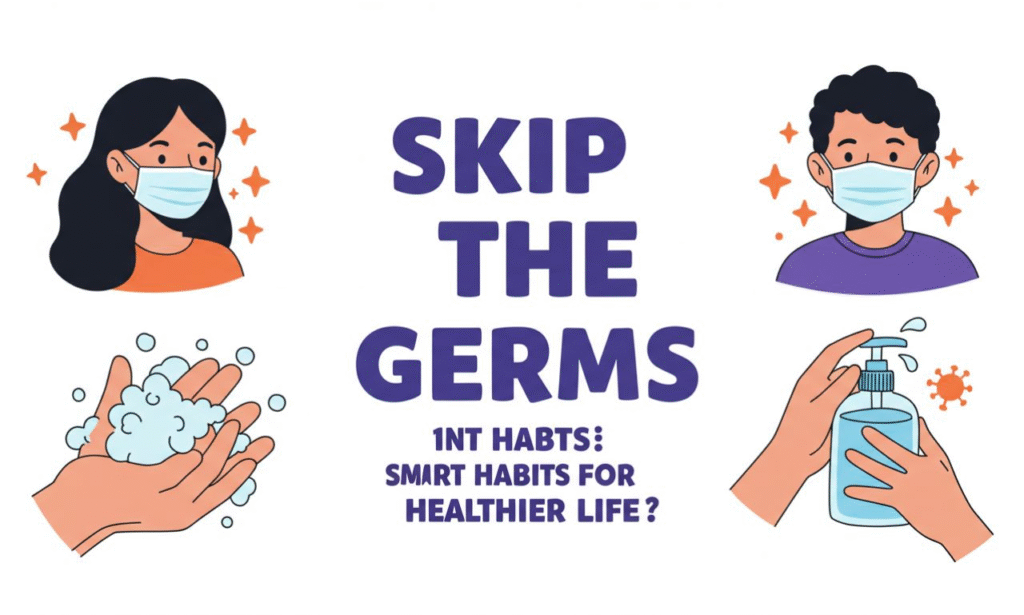Everywhere we go, germs are waiting for a chance to hitch a ride. They’re on doorknobs, desks, toys, phones, and even in the air when someone sneezes. While most germs are too tiny to see, they can make us feel sick if we don’t protect ourselves. The good news? With a few smart habits, it’s possible to “skip the germs” and keep your body strong, healthy, and full of energy every single day.
What Are Germs and Why Should We Skip Them?
Germs are tiny living things that can sneak into our bodies and cause illnesses like colds, flu, stomach bugs, or infections. They’re so small you need a microscope to see them, but don’t let their size fool you—some germs are powerful enough to spread quickly and make many people sick at once.
Not all germs are bad. In fact, some bacteria in our stomach actually help us digest food and stay healthy. But harmful germs—like viruses, certain bacteria, and fungi—are the ones we want to avoid. That’s why we talk about skipping the germs. It’s not about living in a bubble or being afraid of the world. It’s about being smart, staying clean, and making little choices every day that protect us and the people we love.
How Germs Travel and Hide Around Us
Germs are clever travelers. They can ride on hands, clothes, toys, food, and even pets. When someone coughs or sneezes, germs shoot into the air and land on surfaces like desks, phones, or playground equipment. If you touch those surfaces and then rub your eyes, nose, or mouth, germs can sneak into your body.
Some germs can even live for hours—or days—on objects like door handles or tabletops. That’s why places like schools, buses, and playgrounds are hotspots for spreading germs. They’re full of kids, surfaces, and shared spaces where germs hide and wait. By learning where germs like to stay, we can figure out the best ways to skip them and keep ourselves feeling good.
Simple Habits to Help You Skip the Germs
The best part about skipping germs is that it doesn’t take a lot of money or fancy equipment. It’s really about building simple, daily habits that protect your health without much effort. If you can remember a few easy rules and practice them often, you’ll be way ahead of the germs that try to sneak into your body.

Wash Your Hands the Right Way
Handwashing is the superhero move against germs. But here’s the trick: it only works if you do it the right way. That means using warm water, lots of soap, and scrubbing for at least 20 seconds—long enough to hum the “Happy Birthday” song twice. Don’t forget spots like between your fingers, the backs of your hands, and under your nails where germs love to hide.
Wash your hands before eating, after using the bathroom, after playing outside, or whenever you touch something lots of people share, like a railing or computer mouse. Using hand sanitizer is helpful if you can’t find soap and water, but washing with soap is always the best option.
Don’t Share Food or Drinks
It might seem fun to take a sip of your friend’s soda or a bite of their sandwich, but that’s also one of the easiest ways to share germs. Germs from someone else’s mouth can travel on straws, spoons, or bites of food and make you sick. If you really want to skip the germs, keep your snacks, drinks, and utensils just for you. Sharing toys is fine, but sharing spoons? Not so much.
Cover Sneezes and Coughs
Sneezes and coughs are like germ fireworks—they can send tiny droplets flying through the air where other people can breathe them in. The polite and healthy way to handle this is by covering your mouth and nose with your elbow or a tissue. Using your hands is better than nothing, but then you need to wash them right away so you don’t pass germs onto everything you touch. A tissue plus handwashing equals maximum germ-skipping power.
Why Handwashing Is a Superpower
If there’s one habit that works better than anything else, it’s handwashing. Scientists and doctors agree that washing hands properly can prevent more illnesses than almost any other health tip. Think about it—your hands touch everything: money, desks, pets, food, and people. If germs are everywhere, your hands are like taxis carrying them around. Washing them often kicks those germs out of the car and keeps them from catching a ride into your body.
In fact, the Centers for Disease Control and Prevention (CDC) has shown that regular handwashing can cut down stomach illnesses, colds, and even school absences. It’s a simple action that makes a big difference not just for you but also for your family, classmates, and friends.
Germ-Free Tips for School and Play
School is a perfect place for germs because lots of kids are together in one building, sharing supplies and touching the same surfaces. But you can still skip the germs with a few easy habits. Wipe down your desk if it looks dirty, use your own pencils and markers instead of borrowing from everyone, and don’t forget to wash your hands before lunch.
During playtime, especially on playgrounds, germs like to hang out on slides, swings, and climbing structures. That doesn’t mean you should avoid playing—it just means you should clean your hands afterward. If you’re outside, bring along a small bottle of hand sanitizer so you can stay germ-free even when you can’t find a sink.
Keep Your Home a No-Germ Zone
Your home should be the safest place where you can relax without worrying too much about germs. That doesn’t mean you need to scrub everything all day long, but regular cleaning helps stop germs from building up. Focus on the places that people touch most often: light switches, doorknobs, remote controls, and tables.

Clean Toys Often
Toys are one of the biggest germ carriers in a house. Kids touch them, drop them, sometimes even put them in their mouths, and then toss them back into a toy box. That’s why cleaning toys often is a smart way to skip germs. Plastic toys can usually be washed with warm, soapy water, while stuffed animals can go into the washing machine. Keeping toys clean keeps playtime safe.
Wipe Down Phones and Screens
Phones, tablets, and game controllers are magnets for germs because we touch them so much. Studies have found that cell phones often carry more bacteria than a toilet seat! The solution is simple: wipe your devices with a soft cloth and a safe cleaner at least once a week. Not only does this keep germs away, but it also helps your screens look brighter and last longer.
Skip the Germs While Traveling
Traveling brings fun adventures, but it also brings new germs from airports, buses, or hotels. When you’re on the go, carry hand sanitizer and use it after touching handrails, ticket machines, or trays on airplanes. Wipe down the handles of your suitcase or backpack now and then. And remember, drinking water, getting enough sleep, and eating healthy snacks while traveling all help your body stay strong against germs.
Foods That Help Your Body Fight Germs
Skipping germs isn’t just about washing and cleaning—it’s also about giving your body the tools it needs to defend itself. Foods rich in vitamins, minerals, and antioxidants can strengthen your immune system so germs don’t stand a chance. Fruits like oranges, strawberries, and kiwi are packed with vitamin C. Vegetables like broccoli, spinach, and carrots give your body power to fight infections. Yogurt adds healthy bacteria that keep your stomach balanced, while nuts and seeds add zinc, a mineral that helps your immune cells work better. Eating these foods regularly is like building a shield inside your body to skip germs more easily.
The Bottom Line
Germs are everywhere, but that doesn’t mean we need to live in fear of them. By learning how they spread, practicing smart habits like handwashing, covering sneezes, cleaning toys, and eating immune-boosting foods, we can skip the germs and enjoy life without getting sick as often. Remember: small choices every day add up to big health benefits. Whether you’re at school, home, or traveling, you have the power to protect yourself and your loved ones from unwanted germs. Stay clean, stay strong, and most importantly—skip the germs!

